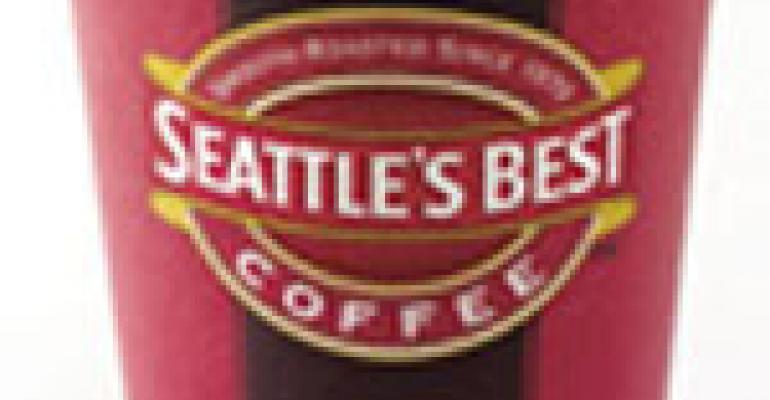The following story is part of this week's special NRN 50 issue, Opportunities knocking: Open the door to bold thinking and unlock your profit potential. Non-subscribers and those who wish to purchase this single issue in its entirety can click here.
Fueled by growing interest in specialty coffees and teas, restaurant chains are brewing up a wide range of offerings to give customers everything from quick pick-me-ups to more elaborate, indulgent treats.
According to data from The NPD Group, a Port Washington, N.Y.-based market research firm, for the year ended in July, there were 474 million more servings of iced tea, a 10-percent increase over a year earlier, and 373 million more servings of specialty coffee, a 15-percent increase over a year earlier. Overall, iced tea captured an 11-percent share of the total beverage market, up from 9 percent in 2003. Specialty coffee grabbed a 6-percent share, up from 4 percent. Now operators are branching beyond iced tea to incorporate more exotic blends, such as green tea, red tea and rooibos.
Market leaders Dunkin’ Donuts and Starbucks, in addition to expanding their well-known coffee selections, both have recently launched new campaigns to boost tea offerings, for example. Dunkin’s “You Kin’ Do It” marketing campaign features its DDSMART menu of better-for-you items, which includes the brand’s iced tea. Meanwhile, Starbucks debuted a new selection of beverages made from antioxidant-rich, full-leaf teas.
A handful of other chains also are tapping into the trend.
Seattle’s Best Coffee .The more than 550-unit nationwide chain, which is a division of Starbucks Corp., also introduced a new tea product to its lineup of beverages with the Vanilla Red Tea Latte. “We’ve been tremendously featuring tea and tea lattes for few years now,” says Steve Hayter, food and beverage director for Seattle’s Best Coffee. “Seasonally that works really great with our guests.” Seasonality plays a big role in Seattle’s Best’s beverage program, so tea is offered all year long with a warm version in the colder months and an iced version during the warmer months. The new latte product came out after the holidays to capitalize on customer’s focus on healthful New Year’s resolutions. But not all customers are looking for healthful options. Value and comfort are sales drivers, particularly during stressful times, Hayter says. Hayter describes Seattle’s Best Coffee as a brand that’s straightforward and approachable. So while the brand wanted to provide guests with rooibos tea, an item that received a lot of buzz and attention in the marketplace, the resulting drink is still faithful to the brand’s image. The latte is made by brewing the rooibos in a slightly concentrated form and adding vanilla syrup and steamed milk. “Even though I think of our products as simple,” Hayter says, “you can still get something great out of three quality ingredients in a right combination and balance.” Tropical Smoothie. The 275-unit chain, based in Destin, Fla., currently is testing new coffee and green tea-based smoothie beverages in 35 of its units. The green-tea smoothies are made with a powdered, concentrated green tea and nonfat yogurt. There are four varieties, each featuring two fruit flavors: peach and pomegranate, pineapple and lime, cranberry and orange, and kiwi and orange. The coffee smoothies all begin with cappuccino flavor, brewed coffee and nonfat yogurt. There are three varieties, which feature sliced almonds, cinnamon and chocolate, respectively. A fourth flavor, already on the menu as a dessert offering called Mocha Madness, features premium chocolate. “Our mission is we’ll give consumers a healthier choice of a high-quality, innovative product,” says Barbara Valentino, vice president of marketing and communications for Tropical Smoothie Café. “Green tea seemed like a very natural thing.… It’s high in antioxidant properties. We also realized coffee smoothies or Frappuccinos have become mainstream, so why can’t we have a piece of that as well?” In fact, the Mocha Madness coffee smoothie existed on Tropical Smoothie’s menu prior to the new tea and coffee introduction, but wasn’t a top seller. Sales increased once the Mocha Madness was moved to the coffee and tea menu, however. While the retail market might have a glut of energy drinks, Tropical Smoothie Café used real fruit juices to create Super-charged Smoothies, using açai berries, goji berries and pomegranate. “There are folks that come to us from the gym for a Power Smoothie that have whey protein or fat metabolizer or vitamins,” Valentine says. “I think one of our differentiating characteristics to our smoothies is that they are real fruit smoothies.… When you look at the ingredient label and only see two or three things and not a lot of preservatives, I think people feel better about themselves and trust that product.” Paciugo. The Dallas-based gelato and cafe franchise that creates gelato flavors using natural ingredients also offers espresso drinks as a nod to the concept’s Italian image. The brand also boasts a wide variety of beverage lines using the concept’s gelato as a jumping point. For example, affogatos are made with espresso or Paciugo’s Italian-style hot chocolate and three scoops of gelato. The brand is also looking to introduce tea to the menu this year, says Cristiana Ginatta, one of the company’s founders. Aside from coffee and tea, Paciugo’s gelato is used as a base for a number of drinks as well. Combined with Italian sparkling water or soda it creates the chains’ Frizzante beverages. With 32 to 40 different flavors offered daily and made in-store, including fruit and vegetable blends like strawberry and celery and beets and banana and floral flavors using rose or lavender, the combinations and possibilities are open to what the guests want. “We received a lot of great comments at the stores that we have drinks with natural ingredients and sugar,” Ginatta says. “People are looking for more of these natural drinks. You can go in any convenience store or soda fountain for a drink, so what we’re looking for is essentially what complements our gelato.”




